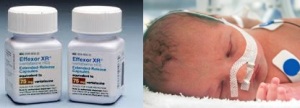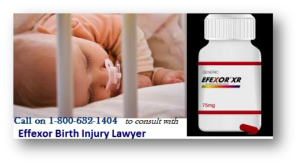
In 2005, the Journal of the American Medical Association published a study entitled “Neonatal signs after late in utero exposure to serotonin reuptake inhibitors: Literature review and implications for clinical applications.” This was the first convincing evidence linking congenital birth defects with Effexor, Zoloft, and similar antidepressants and with it began the decade-old debate over the efficacy of antidepressant use during pregnancy.
A 2006 report in the New England Journal of Medicine claimed a six-fold increase with the threat of fatal lung disorder in babies if Effexor is ingested by a pregnant woman. The British Medical Journal linked the drug use during pregnancy to congenital heart defects in 2006 and published more research evidence on Effexor birth defects in newborns in 2013.
What is Effexor?
Effexor is the first serotonin-norepinephrine reuptake inhibitor or SNRI antidepressant to be introduced. From 1993, when it was approved, to 2011, the drug was one of the most-prescribed antidepressants. The original manufacturer was Wyeth, which has been a part of Pfizer since 2009. Made to regulate mood-controlling neurotransmitters, the drug is suggested to treat anxiety and depressive disorders.
The manufacturer promoted the drug as superior to other antidepressants and claimed a fewer side effects. The product labeling, however, does not carry any warning for pregnancy side effects. Nor did the manufacturer bother to inform about potential Effexor birth defects risks.
What are major Effexor birth defects?
Research reports started appearing in the early 2000s warning of pregnancy-linked Effexor birth defects. By 2012, there were dozens of reports highlighted the association of the drug with many fatal and non-fatal birth deformities. The high possibility of babies born with defects following prenatal exposure to the drug has manifested in coining of the term “Effexor Baby.”
Effexor antidepressant pregnancy side effects are found to be capable of causing congenital birth defects, such as
- persistent pulmonary hypertension and hypoxemia attributed to hypoplastic lung problem
- long-term heart defects in newborns, including septum wall defect, intra-cardiac blood shunting, heart hole, hypoplastic hole, ventral, atrial, and septal deformities, omphalocele, and heart failure
- cranial defects, including underdeveloped brain, malformations in the brain, imperfect skull
- physical defects, including vertebra deformities, flawed neural tube, cleft palates and lip, abdominal malformation, anus deformities
- developmental delays, slow learning, speech and walking problems, delayed growth
- neurological problems in newborns
What to consider while filing an Effexor birth defect lawsuit?
The checklist prior to the filing of an Effexor birth defect lawsuit must take note of the following points.
- Statute of limitations: Each state has its own statute of limitation, a legal framework prescribing time limit for filing various kinds of lawsuits. Find out what is the deadline for drug injury lawsuits. In Tennessee, for example, the statute of limitations for a Tennessee Effexor birth defect lawsuit is one year.
- Evidence: Identify if the birth defect claim is directly or indirectly related to the use of Effexor antidepressant.
- Documents: You will need to review medical and other documents to support your claim, including the pharmacy records to prove you were prescribed the medication during the first trimester of pregnancy.
- Consult with Counsel.
What to allege in an Effexor birth defect lawsuit?
Remember that every case is different. An Effexor birth defect lawsuit can seek various types of damages, such as
- Recovery of past medical expenses
- Financial assistance for future medical costs
- Compensation for disability
- Compensation for physical suffering, emotional trauma, and loss of wages
- Punitive damages
Am I eligible to file an Effexor birth defect lawsuit?
If your child is a victim of Effexor birth defect and you are willing to seek financial damages for product liability, please contact our Effexor birth defect lawyer at 1-800-632-1404 for a free consultation.

